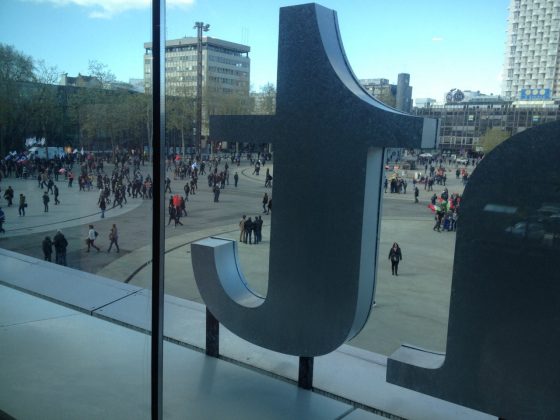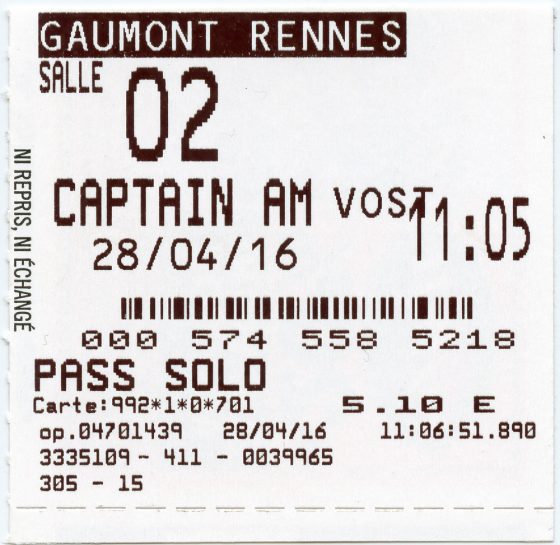Captain America: Civil War

Thanks Rage!
On the 28th of April, I went to Rennes to see Captain America: Civil War, not realizing that there was some protest or another. Being more interested in feeling just than achieving justice, the students in question decided to set things on fire and spray-paint slogans on individual run stores. For jobs! Likewise, I became consumed with exacting some kind of tattoo-based revenge on anyone I could find with a spray can. Until I found out that the police had shot some poor kid in the face with a riot gas canister, and he lost an eye, and I felt like a real dick. Not a lot was solved that day.

But wait! In the ignorant rage-fueled bike ride home, I did figger something out about Captain America: Disagreement over Sub-clause 4, section 2B. It goes without saying, meaning I wish it had, that there is a lot of talking. At 150 minutes, how could there not be? It is further the same old stuff we’ve heard before: the heroes are to blame for everything, and society hates them. This is no different than Superman v. the Board of Education, but it’s a bit weird here for anyone who’s actually bothered to see the films. And yes, I’m aware that it’s weirder that I have seen the movies, weirder still that I would remember enough to apply logic to them. And the logic. That’s not me at my finest.

Doesn’t look any more than a collection of wandering goofs, overlooked by the paternal Gaumont logo. Weirdly, I didn’t read about any of the damage anywhere else. Yep, I’m a journalist. Now you’re scared.
Nevertheless, from the moderately entertaining Avengers 2, we had a situation wherein said Avengers saved the world. Not terribly interesting, sure, but, and once again let’s emphasize this, they saved the world. The whole thing. No doubt there was a female character who complained about it, but they saved it anyway.
Now during this saving of the world, a few people died. And utterly unlike the destroy everything ethos of Man of Steel, a relatively bland decision was made to save some townspeople whilst saving the world.
In whatever reality we/they/us inhabit, one could make the argument that this was moderately irrational. In the intervening years between now and the World Wars, the idea of individual sacrifice so terrifies us that we can’t even have movie characters do it (i.e. the teensy part of Saving Private Ryan that you don’t remember, i.e. the last two hours). Americans don’t like tough decisions, so they forgo the middleman and forget about consequences. It’s not inelegant.
The familiar characters are going to fight each other with their powers and such. And this is the beginning, even though it comes at the end and at the price of the beginning and middle.
So the Avengers proceeded to save the world and the adorable moppets, old folks, couples and dogs, even if it means that they would have died, with everyone, if you don’t save the world. Okay, dogs, fine. I get it. And the people to take care of them. Fine.
This is not re-inventing narrative to be sure, but it is what happens in Avengers 2. The filmmakers/giant faceless committee machine that gave us CA:What is it good for? have seemingly forgotten that this was the plot of the previous film, and now the Avengers are being blamed – over and over and over – for the one person who did die.
Methinks thou doth render video surveillance footage of things that are not from a video surveillance perspective too much, for at the seventh mention of how everyone hates them, I knew something compulsive was seeping through. And on the bike ride back it hit me. No, not a spray can or a tear gas canister (Five paragraphs. Too soon?). This is about the death of empire, and the loss of sovereignty. Then it hit me: that’s not the greatest insight in the world. Technically, the second insight is smarter than the first.

In the way of being me, there was a close moment when a long line of marchers had blocked the road to the cinema with only 5 minutes until the trailers were finished. I hopped the sidewalk and went around. It should tell you this was considerably more exciting than the film itself. For you as well.
Now one could opine on America’s struggle to come to terms with the idea of being controlled by the bad guy (yep, it’s the UN, which makes the film feel tailor-made for the very specific audience of liberty nuts, Randians and people who believe that resolution 373 was watered down to pander to Argentinean boating interests). And there’s many an essay to be written by people who see one superhero film and think that they have something to say about Culture.
But here’s what I have to say! The End of Empire, as a motivation, is rather abstract. Revenge. Got it. Money. Fine. Saving the world, even one person, that’s a pretty good motive. Kissing the Cute Girl/Boy, Self-preservation, Doggies, and so on. Very relatable. I am genuinely hard pressed to think of something less compelling as a motivation for said Civil War as maybe they should vote or something about something or other. I feel more strongly about sidewalk widths and postbox distances, both of which I hesitate to bring up in fear of a Captain America: Moderate Disagreement about Regulatory Bodies.
From the writing perspective, I get it. You start, so to speak, with the scene where Spidey fights Black Widow who does a backflip on Ant-man and so on. You know this scene is going in. And you have to get there. The familiar characters are going to fight each other with their powers and such. And this is the beginning, even though it comes at the end and at the price of the beginning and middle.
But in the case of sovereignty, sovereignty, who’s got the sovereignty, you kinda forget what it’s all about/for. The characters themselves are no less confused as they constantly switch sides, as if there were sides to switch. In this case, it’s whether or not the Avengers should be ruled by a government agency with inter and intra-national ties instead of being ruled by another secret government agency, which they then stopped being ruled by, and kind of just created an ad hoc method of doin’ stuff. During a massive fight scene, it’s stretches.
Now, I could give away the brow-furrowingly non-ending…and here I go.
You killed my parents! I kill you!, says Mr. Downey Jr. to Mr. Sebastian Stan after seeing video surveillance footage from 1980 from a camera seemingly set-up in a place on a road chosen so that there would be no video surveillance footage. This is the climax, and it has the kind of We’re-going-to-fool-you-by-not-having-much-of-a-climax-not-because-we-couldn’t-think-of-one-quality-but-because-we’re-subverting-the-superhero-paradigm you’d expect.
But even the normally compelling motive of revenge is here flattened. Not wanting consequences (see above), Mr. Stan was under our classic Super Soviet mind control, said mind control which 1) Mr. Downey Jr. has witnessed first-hand, and 2) exist in a comic-book universe that is full of shit like this.
I could see him being mad, but it’s something that exists in the universe to take away responsibility. The arc is you killed my father, fight fight, chase, get away, talk, talk, talk, talk, CGI spectacle, chase, fight, reveal it was soviet mind control, then forgiveness. You go out of your way to make that character sympathetic, but you don’t want to pay the toll.
In watching the film, it can’t be any clearer how much motives matter. It’s our in to the character. We want spectacle, sure, but if we can’t relate to the basics, or if you’re spending an inordinate time discussing why you’re doing what you’re doing, I’m going to be, and was, bored.
As Hannibal Lecter and, in this case, Deadpool, demonstrate, we will put up with a lot of bad behavior, if we have an in to the character. Deadpool wanted to kiss the girl and revenge, and I was in. As with the Hitchcock villains of yore, it just takes something simple, like a believable mistake, and we will care what happens. All this effort to make characters sympathetic makes them inhuman. What kind of movie would do that?
The Take

$1.25
The Lonely Comments Section

 [logo]
[logo]